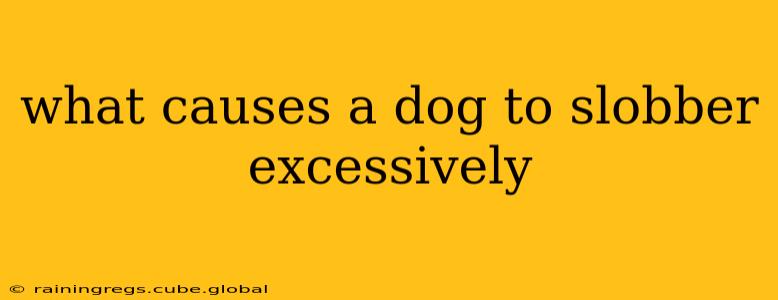Excessive drooling, or hypersalivation, in dogs is a common issue that can stem from various causes. While a little drool is normal, particularly in breeds predisposed to it (like Saint Bernards and Mastiffs), excessive drooling warrants attention as it can indicate underlying health problems. This comprehensive guide explores the potential reasons behind your dog's excessive slobbering, helping you understand when it's simply a breed trait and when it requires veterinary intervention.
Is My Dog's Breed Prone to Drooling?
Some dog breeds are naturally predisposed to drooling more than others. This is often due to their facial structure and the way their mouths are shaped. Breeds like:
- Saint Bernards: Known for their copious amounts of drool.
- Mastiffs: Their large, loose jowls contribute to significant drooling.
- Bulldogs: Their short snouts often lead to drool accumulation.
- Great Danes: Their size and facial structure predispose them to excessive drooling.
- Newfoundlands: These gentle giants are infamous for their slobbery nature.
If your dog is one of these breeds, some drool is expected. However, a sudden increase in drooling should still be investigated.
What Medical Conditions Can Cause Excessive Drooling?
Beyond breed predisposition, several medical conditions can trigger excessive drooling in dogs. These include:
-
Dental Disease: Gum disease, abscesses, or other oral problems can cause discomfort and lead to increased salivation. Regular dental check-ups are crucial for maintaining your dog's oral health.
-
Gastrointestinal Issues: Nausea, vomiting, or other gastrointestinal upset can stimulate increased saliva production.
-
Kidney Disease: As kidneys lose their ability to properly filter waste, toxins can build up, affecting various bodily functions, including saliva production.
-
Nervous System Disorders: Conditions affecting the nervous system can sometimes lead to uncontrolled salivation.
-
Foreign Body in Mouth or Throat: Something lodged in your dog's mouth or throat can cause significant discomfort and excessive drooling.
-
Poisoning: Exposure to certain toxins can trigger hypersalivation as a symptom.
-
Mouth Cancer: In some cases, excessive drooling can be a sign of oral cancer.
Could Stress or Anxiety Be the Culprit?
Just like humans, dogs can experience stress and anxiety, and this can manifest in various ways, including increased drooling. Situations like car rides, visits to the vet, or exposure to loud noises can trigger stress-induced salivation.
Is My Dog Drooling Because of Medications?
Some medications can have excessive drooling as a side effect. If you've recently started your dog on a new medication and notice increased drooling, consult your veterinarian.
How Can I Tell If My Dog's Drooling is Excessive?
Determining if your dog's drooling is truly excessive requires observation. Consider these factors:
- Breed: Is your dog a breed known for drooling?
- Frequency: How often does your dog drool?
- Amount: Is the amount of drool significantly more than usual?
- Consistency: Has there been a sudden change in the amount or consistency of the drool?
- Accompanying Symptoms: Are there other symptoms, such as vomiting, lethargy, or difficulty breathing?
If you notice a sudden increase in drooling, particularly accompanied by other symptoms, it's crucial to consult your veterinarian.
When Should I Take My Dog to the Vet?
Don't hesitate to seek veterinary attention if your dog's drooling is accompanied by any of the following:
- Sudden onset of excessive drooling
- Changes in appetite or behavior
- Difficulty breathing or swallowing
- Vomiting or diarrhea
- Lethargy or weakness
- Fever
Excessive drooling in dogs can be a sign of something minor or a more serious underlying condition. Regular veterinary check-ups and prompt attention to any significant changes in your dog's behavior are essential for ensuring their health and well-being. Remember, a veterinarian can properly diagnose the cause and recommend appropriate treatment.
